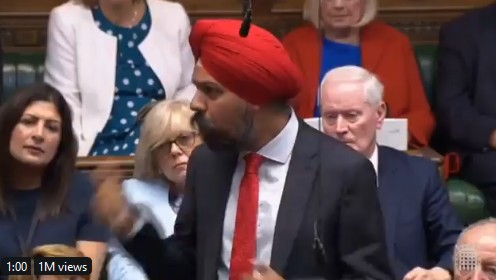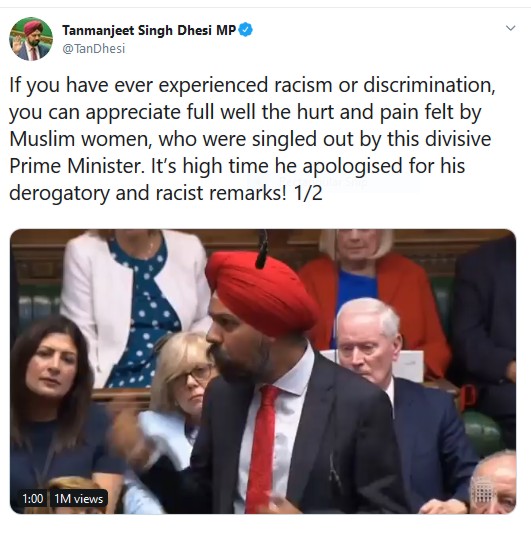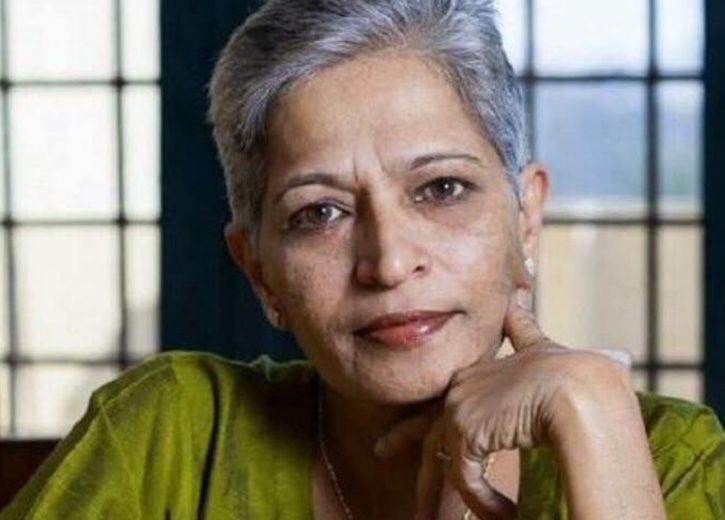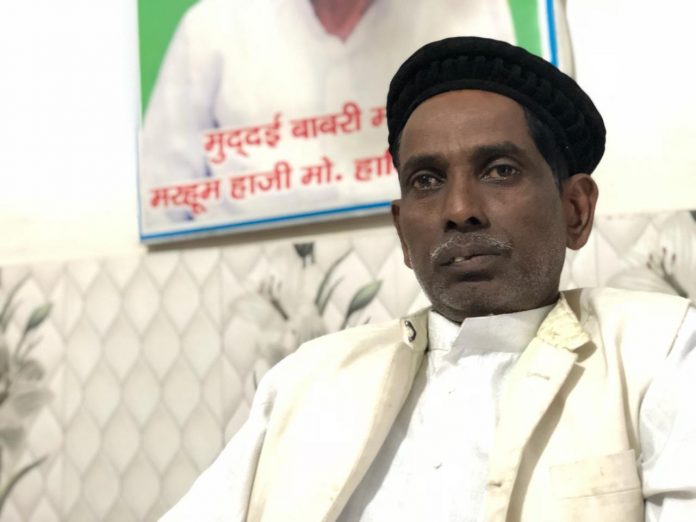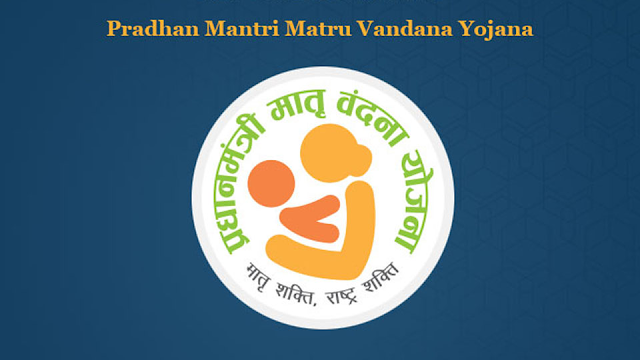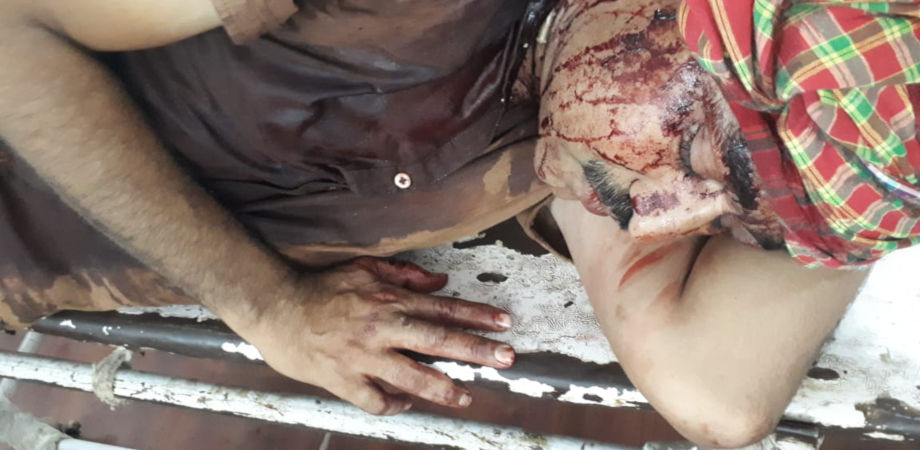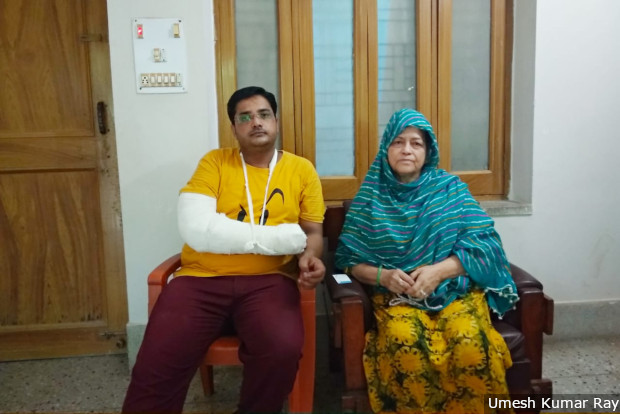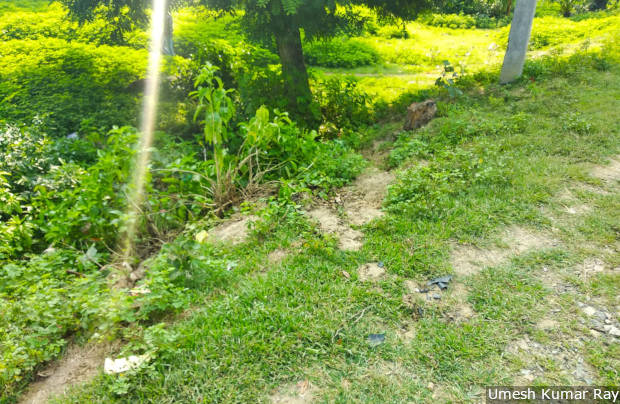Gaya, Bihar: Five Muslims, including an eight-year-old boy, were injured as a mob here attacked them over suspicions of child lifting on August 25, 2019.

Mohammed Kaisar (43) and three of his relatives were attacked by a mob on suspicions of child-lifting in Gaya, Bihar. On learning the victims’ faith, the mob shouted “Maar Miyawan Hai [Beat them, they are Muslims]”, and intensified the attack. This is the ninth attack in August 2019 over rumours of child lifting in the state. Photo shared by the victims.
“Maar Miyawan Hai [Beat them, they are Muslims]”, the mob shouted and intensified the attack when they discovered their victims were Muslim, eye-witnesses told FactChecker.in. In an unrelated incident on the same day, the forest department booked the four adult victims for killing protected birds.
This is the ninth attack over rumours of child-lifting in Bihar–after five people were killed in eight attacks during August 2019, as FactChecker.in reported on August 27, 2019.
Nationwide, since 2012, 44 people have been killed and at least 136 injured in 88 attacks linked to child-lifting rumours, according to a FactChecker.in database that tracks such attacks. Odisha had the most attacks (15), followed by Tamil Nadu (13) and Bihar (10). Most attacks (69) were reported in 2018–94% of those in the May-July period.
This is also the third hate crime motivated by religious bias in Bihar this year, according to Hate Crime Watch, a FactChecker.in database that records such attacks. Since 2009, Hate Crime Watch has recorded 302 hate crimes, which led to 101 deaths and at least 746 injuries.
Muslims (14% of India’s population) were victims in 60% of hate crimes; Christians (2% of population) in 14% cases; Hindus (79.8% of population) in 14% cases. In 10% or 30 incidents, the religion of victim(s) was not reported. Of the 272 incidents in which the religion of the victims was known, Muslims were victims in 67% attacks, Christians in 15% and Hindus in 15%.
Of 302 cases, Hindus were alleged perpetrators in 59% or 178 cases, Muslims in 12% or 36 cases. In 86 cases, the religious identity of the perpetrator was not known. Of the 216 incidents in which the religion of the alleged perpetrator has been reported, 82% or 178 cases involved Hindus as perpetrators, and in 17% (36) cases the perpetrators were Muslims. Sikhs were perpetrators in 1% (2 incidents).
The attack
At about 3 pm on August 25, 2019, the victims–Waliur Rahman alias ‘Goldy’ (35), Mohammed Kaisar (43), Liyaqat Ali (24), Mohammed Ayaan (8) and their driver Abu Sheeh (27)–were travelling in a car from Gaya to Maher village, 20 km away, to meet Shivbaalak Yadav (referred to as Mukhiyaji or headman) for a litti chokha (stuffed whole wheat dough balls) party.
Waliur, Kaisar and Liyaqat are cousins, and Ayaan is Waliur’s son. The victims run a bunch of petrol pumps and Rahman is the grandson of Mohammed Latifur Rahman Sardar, a former Bihar legislator and a freedom fighter active in the Khilafat movement.
Only Ali and Ayaan were present when we visited them: While Rahman was being treated for a severe head injury in Ranchi, Kaisar and Sheeh were being treated in Delhi, Mohammad Hatim, Ali’s brother, told FactChecker.in at Rahman’s residence in Gaya. Ali refused to speak to FactChecker.in citing his lawyer’s advice. “I will have to record my statement in the court so our lawyer had advised me not to talk to media,” he told us, his fractured right hand in a cast.

Liyaqat Ali fractured his right hand during the assault. He is seen here at his home with Waliur Rahman’s mother, Ayesha Rahman.
On the way to Maher, the victims called Yadav to ask him where he was. Yadav told them to wait in the market, at Maher chowk, saying he would meet them there. They waited at the market until one of Yadav’s relatives told them he was back home. At 7 pm, the men set off towards Maher village to meet Yadav.
At this point, locals shouting “bachha chor (child-lifter)” chased the car and threw stones and bricks at it, Hatim said. The windows were damaged and the victims were injured by the stones and bricks, Hatim said.
The victims tried to escape by driving towards the highway, when the driver lost control of the car–1 km away from Maher chowk. The car rammed into a tree, and the locals forced them to come out of the car.

The location where the victims’ car rammed into a tree, and the locals forced them to come out of the car.
When the victims identified themselves, Hatim said, the mob raised communal slogans: “Maar Miyawan Hai [Beat them, they are Muslims]”. This was followed by “Hindustan Zindabad, Pakistan Murdabad (Long Live India, Death to Pakistan)”.
Local Muslims intervened and tried to pacify the mob, saying they belong to a reputed family and were no child-lifters. “By then Ayaan too had come out of the car and begged the mob to not hurt his father and uncles,” added Hatim. Ayaan was injured in the process.
The aftermath
Local brought the victims to Takiya Mohalla–4-5 minutes by walk–to prevent further attacks. They eventually called the police, who arrived with an ambulance.
Acting on the complaint filed by Kaisar, Tankuppa police lodged a first information report (FIR) against 19 named and 100-150 unnamed suspects. So far, three people–Ganesh Chaudhary, Sanjay Yadav and Arvind Manjhi–have been arrested. Chaudhary lives in the nearby village of Mahmadpur while Sanjay Yadav and Manjhi are residents of Maher.
An eyewitness, Mohammad Rafique Shah of Takiya Mohalla, confirmed the sequence of events. The attackers were drunk, Shah added, saying that the illegal liquor business continues to thrive in the area despite an April 2016 state government ban on liquor.
“As the people of Takiya Mohalla took the victims to their homes, the mob accused them of giving shelter to terrorists,” said another eyewitness who did not want to be named. At one point, he said, he thought riots may break out.
Local mukhiya (headman) Kanhai Paswan corroborated the claims of Rafique Shah and other eyewitnesses. “I was not present on the spot, but next morning my Muslim friend came to me and said that these types of slogans were raised,” he told FactChecker.in. “This kind of Hindu-Muslim thing was never seen in this village.”
Police denied such slogans were raised. “When we were on the spot, no such slogans were raised,” Vikash Chandra, station house officer of Tankuppa, told FactChecker.in. Other police officers including Circle Officer Chhotelal Paswan said they had no knowledge of such slogans being raised, and that no proof existed to substantiate this claim.
Police had only reached Takiya Mohalla, as we said, after the victims were brought to the area to prevent further attacks.
The victims’ statement also does not mention the communal slogans. When asked about the exclusion, Hatim told FactChecker.in that they were injured and disoriented at that time.
The killing of protected birds
The forest department has lodged a case against the four adult victims, charging them with killing protected birds.
“We have lodged a complaint in the DFO [divisional forest officer] court,” said Manoj Kumar, the DFO of Gaya. “Our field officers reached the spot after the attack where two air guns, one rifle, and the carcass of four spotted doves were recovered from the car.”
Spotted doves are a protected species, under Entry 19, Schedule IV of the Wildlife Protection Act, 1972. “From the condition of the carcass, it seems like they were hunted barely 4-5 hours earlier, but we can confirm only after the postmortem report,” Kumar told FactChecker.in
Hatim said the men were only carrying one licensed rifle due to the Maoist presence in the area, but that the rifle was “snatched by the mob”. The next day, when they visited Tankuppa police station to enquire about the rifle, the police told them to focus on their treatment and let them deal with the recovery of the weapon, he added.
The victims learnt about the charges only later.
“They had only one rifle, which was snatched by the mob. So how did the forest department recover it from the car?” said Hatim.
The DFO has accused the victims of cooking up a story which they did not find coherent. “So far, the investigation has not been initiated. When we start the investigation, they will be produced before DFO court and judicial court.”
Back in Gaya, the incident has left the victims and their family in shock. Ayesha Rahman, Waliur’s mother, said, “If they [the mob] were shouting ‘child lifter, child lifter’ then they should have stuck to that slogan only. Why did they raise slogans against Muslims?”
“If they were child lifters, then they should have been handed over to the police,” she added. “Why were they beating them, including an eight-year-old child? The child has still bruises on his body.” The family has demanded stern punishment for the culprits.
(Ray is a Patna-based freelance writer and a member of 101Reporters.)
First published on https://www.factchecker.in/



